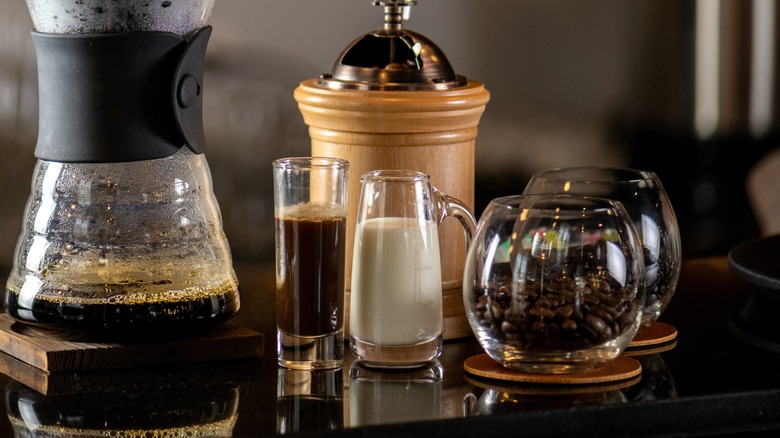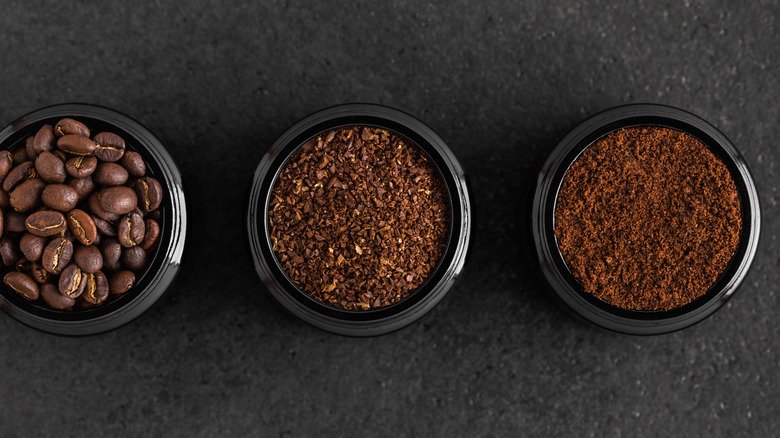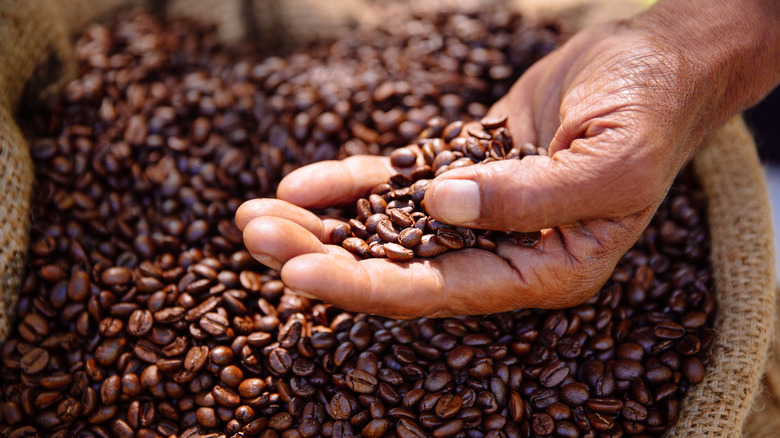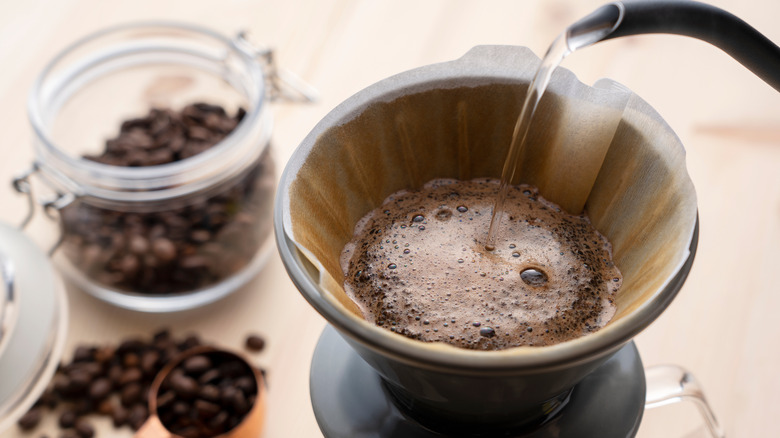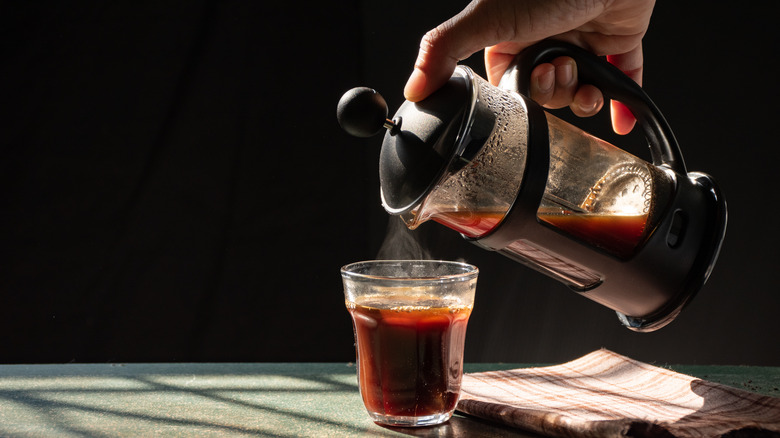5 Reasons Your Home-Brewed Coffee Tastes Sour
So you've bought a shiny new espresso machine (or whichever brewing equipment that tickled your fancy), snagged a bag of freshly ground beans from your local roaster, heated your water, and assembled everything to pour a cup of home-brewed coffee. You seem to have done everything right, only to then find a sour, acidic tang in your java. Is it the rotten batch of beans or dirty water to blame, you wonder — or perhaps some chemical coating lacing your new brewing equipment?
Not to be confused with bitterness which is often the result of over-extraction and prolonged brewing, the sour tang in your brew might be due to one of many reasons. It could be that you're using coffee beans that are either too old or too fresh, or that you're grinding them to the wrong size, which results in an under-extracted cup of joe. Even the water that you use to brew your java could play a role in its tart flavor. Knowing what's causing your home-brewed coffee to taste sour is key to fixing the problem — after all, who wants to begin their day with an eye-puckering cup of coffee first thing in the morning?
Check the grind size of your beans
Often, the culprit behind sour coffee is the grind size of the beans used to brew it. It all comes down to finding the best grinder setting for your coffee to make the best cup of coffee, and that depends on your machine. For example, espresso machines require much finer grounds than the likes of a French press, moka pot, or drip coffee makers. Cold brews are on the very other end of the spectrum and need a coarser grind size that will produce a texture similar to that of rock salt.
Sourness is typically the result of using coffee beans that are coarser than required (like using grounds meant for cold brew makers in an espresso machine instead, for instance). The coarser the beans, the longer the water takes to extract flavor from them. Using them in the wrong equipment could leave you with an under-extracted brew, which will give a noticeably acidic tang to what should be a balanced cup of joe.
If all signs do point to this being the problem, pop the beans back in your grinder and blitz them again. It's also important to consider the type of grinder you're using: Blade grinders are notorious for producing uneven grounds that don't brew properly and leave a tinge of sour flavor. Consider picking a burr grinder over a blade one for more uniform grounds and better flavor extraction instead.
Your coffee beans are too old...or too fresh
Unless you brew several cups of java every day, chances are that your beans sit in the pantry for weeks till they are used up. But if you notice a sour flavor lacing the brew, it's time to check just how long they've been in there. In general, coffee beans stay fresh for anywhere between six and nine months once they are roasted and packed. But with time, they become stale, sour, and acidic. Exposure to moisture, air, and sunlight also causes beans to oxidize and produce acetic acid, which in turn gives them an unpleasant bite.
This is why the golden rule about home-brewed coffee is to use fresh beans. That said, make sure that they aren't too fresh either — yes, there are several longstanding myths about coffee but using too-fresh beans isn't one of them. Coffee beans develop gasses when they are roasted, which need time to escape and evaporate. If you brew the beans too soon after they are roasted, you risk the gasses hindering proper flavor extraction and leaving behind sour notes instead.
Coffee beans can take anywhere between three and 14 days to degas properly. If the beans are going to be brewed using a method with prolonged exposure to water — think pour overs and French presses — a few days should be enough for them to degas. However, if you're using a quicker method (like pulling an espresso), you will want to give them longer.
It's the roast level of your beans
Another factor that can contribute to a sour brew is how the beans are roasted. For instance, some methods of roasting involve shocking the beans with flashes of hot air for short durations. While this browns them from the outside, it fails to break down the acids present inside. These acids then leech into the brew and lace it with a vinegary flavor.
That said, it's also important to note that some beans are naturally more sour than others. For instance, coffee beans that are described to have fruity and citrusy notes can be perceived as sour, especially by those who are used to beans with more full-bodied, nutty, and chocolaty tones. Consider avoiding these if you're not a fan of the slight tang.
You might also want to avoid light roasted or blonde beans and go for dark or medium roasted ones instead. A dark roast breaks down the acids that are naturally present inside the beans much better, giving them a robust flavor that leans towards bitterness. On the flip side, the beans retain more of their acids when they are roasted lightly, which means they can often taste a tad sour to those not used to it. However, such beans will only have a bright and zesty tang similar to that of some tropical fruits — they should never have the eye-puckering sharpness of chemicals. The latter is a sign of a truly sour home-brew that could do with some fixing.
The water may be to blame
In most cases, coffee has all but two elements: the beans and the water. So if everything seems to be fine with the beans, chances are it's time to start looking at the water that you're using. Under-extraction is the main reason why brews taste sour, and water plays a significant role here. To begin with, make sure that your water is hot enough. Ideally, the beans require water that is between 195 and 205 degrees Fahrenheit. Heat it any higher, and you'll notice a bitterness in the brew, but use lukewarm water, and you'll have an under-extracted java that tastes sour.
The quality of water matters when brewing coffee as well. Tap water often contains chlorine and minerals that can seep into your brew. You might even find that it's not the beans but the water that's actually sour, as soft water with a pH level below seven can have an acidic aftertaste. If you're using tap water, consider switching to filtered and pH neutral water for your home brews. It's also worth double-checking the quality and cleanliness of your water while you're at it: The sourness can also be due to bacteria present in dirty water.
The balance of water and coffee isn't right
If all seems well with the beans and the water, but you're still left with an acidic cup of joe, the answer may be in how you brew the two. For one, make sure that you're not skimping on either the water or the coffee beans. The exact proportion of coffee and water will differ depending on the brewing method, but when in doubt, a good ratio to go by is to use 1 or 2 tablespoons of ground beans (based on how strong you want the java to taste) for every 6 ounces of water. If you notice a sour tang in your coffee, chances are that you're using more water and less beans.
If the sourness still persists, consider brewing your coffee for a little longer. This is because when coffee is brewed, the acid present inside the beans is the first thing that is extracted, followed by oils, sugars, and delicate flavors. If you don't give your java enough time to brew, all that you will have is a sour cup of coffee that lacks those sugars, oils, and flavors that would have balanced the acid in the drink.
Wondering what you can do if you've already brewed a sour coffee, though? Well, it's not too late to save the day yet — simply add a splash of cream or stir in a sweetener to balance the flavors, and you'll be good to go!

